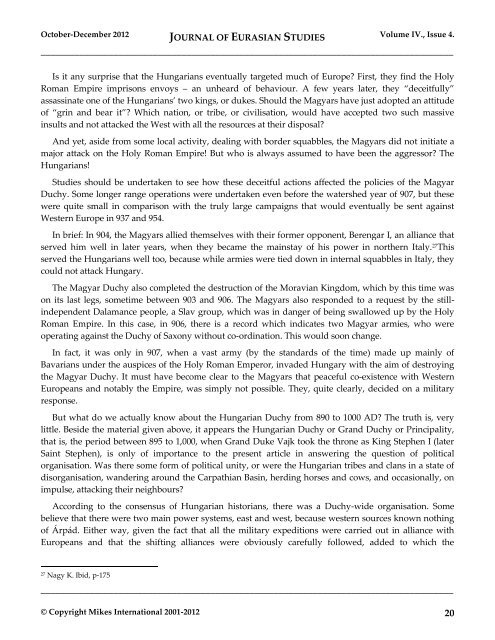Create successful ePaper yourself
Turn your PDF publications into a flip-book with our unique Google optimized e-Paper software.
October-December 2012 JOURNAL OF EURASIAN STUDIES Volume IV., Issue 4.<br />
_____________________________________________________________________________________<br />
Is it any surprise that the Hungarians eventually targeted much <strong>of</strong> Europe? First, they find the Holy<br />
Roman Empire imprisons envoys – an unheard <strong>of</strong> behaviour. A few years later, they “deceitfully”<br />
assassinate one <strong>of</strong> the Hungarians’ two kings, or dukes. Should the Magyars have just adopted an attitude<br />
<strong>of</strong> “grin and bear it”? Which nation, or tribe, or civilisation, would have accepted two such massive<br />
insults and not attacked the West with all the resources at their disposal?<br />
And yet, aside from some local activity, dealing with border squabbles, the Magyars did not initiate a<br />
major attack on the Holy Roman Empire! But who is always assumed to have been the aggressor? The<br />
Hungarians!<br />
<strong>Studies</strong> should be undertaken to see how these deceitful actions affected the policies <strong>of</strong> the Magyar<br />
Duchy. Some longer range operations were undertaken even before the watershed year <strong>of</strong> 907, but these<br />
were quite small in comparison with the truly large campaigns that would eventually be sent against<br />
Western Europe in 937 and 954.<br />
In brief: In 904, the Magyars allied themselves with their former opponent, Berengar I, an alliance that<br />
served him well in later years, when they became the mainstay <strong>of</strong> his power in northern Italy. 27 This<br />
served the Hungarians well too, because while armies were tied down in internal squabbles in Italy, they<br />
could not attack Hungary.<br />
The Magyar Duchy also completed the destruction <strong>of</strong> the Moravian Kingdom, which by this time was<br />
on its last legs, sometime between 903 and 906. The Magyars also responded to a request by the stillindependent<br />
Dalamance people, a Slav group, which was in danger <strong>of</strong> being swallowed up by the Holy<br />
Roman Empire. In this case, in 906, there is a record which indicates two Magyar armies, who were<br />
operating against the Duchy <strong>of</strong> Saxony without co-ordination. This would soon change.<br />
In fact, it was only in 907, when a vast army (by the standards <strong>of</strong> the time) made up mainly <strong>of</strong><br />
Bavarians under the auspices <strong>of</strong> the Holy Roman Emperor, invaded Hungary with the aim <strong>of</strong> destroying<br />
the Magyar Duchy. It must have become clear to the Magyars that peaceful co-existence with Western<br />
Europeans and notably the Empire, was simply not possible. They, quite clearly, decided on a military<br />
response.<br />
But what do we actually know about the Hungarian Duchy from 890 to 1000 AD? The truth is, very<br />
little. Beside the material given above, it appears the Hungarian Duchy or Grand Duchy or Principality,<br />
that is, the period between 895 to 1,000, when Grand Duke Vajk took the throne as King Stephen I (later<br />
Saint Stephen), is only <strong>of</strong> importance to the present article in answering the question <strong>of</strong> political<br />
organisation. Was there some form <strong>of</strong> political unity, or were the Hungarian tribes and clans in a state <strong>of</strong><br />
disorganisation, wandering around the Carpathian Basin, herding horses and cows, and occasionally, on<br />
impulse, attacking their neighbours?<br />
According to the consensus <strong>of</strong> Hungarian historians, there was a Duchy-wide organisation. Some<br />
believe that there were two main power systems, east and west, because western sources known nothing<br />
<strong>of</strong> Árpád. Either way, given the fact that all the military expeditions were carried out in alliance with<br />
Europeans and that the shifting alliances were obviously carefully followed, added to which the<br />
27 Nagy K. Ibid, p-175<br />
_____________________________________________________________________________________<br />
© Copyright Mikes International 2001-2012 20

















